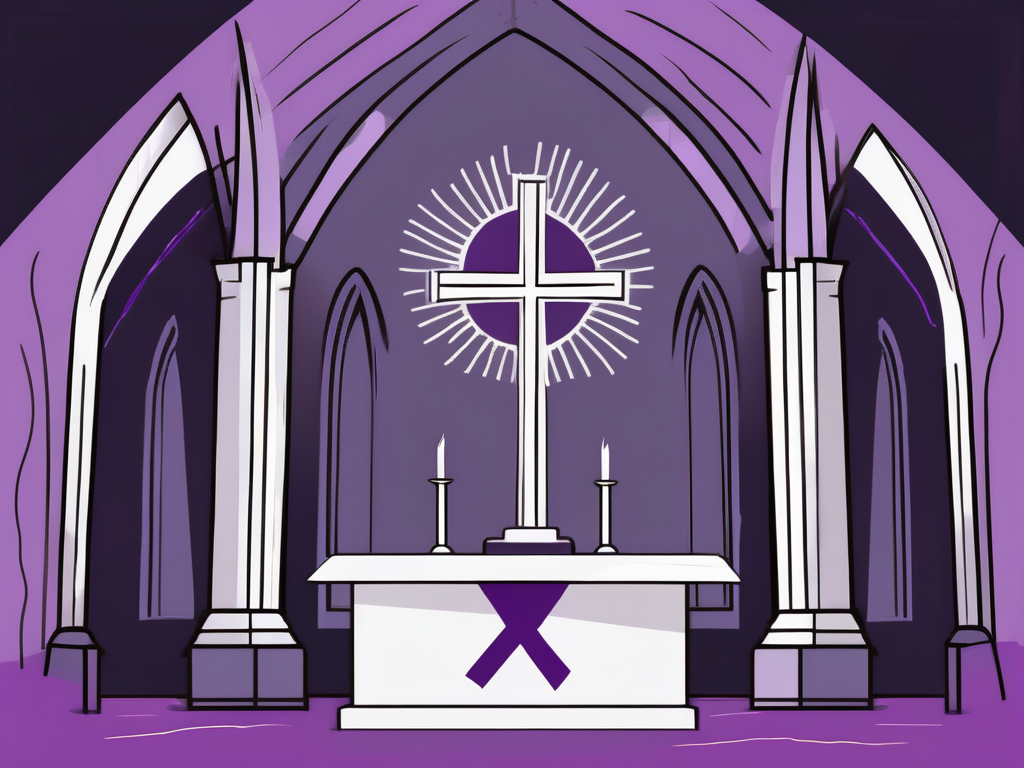Lent is a significant period in the Christian calendar that holds deep meaning for believers around the world. This season, spanning forty days and forty nights, has a rich historical background and profound theological significance. Beyond its historical and theological aspects, Lent is also observed in various ways among different Christian denominations, each with its unique traditions and customs. In this article, we will explore the origins of Lent, its theological implications, its observance in different denominations, and the impact it has on the lives of Christians.
The Historical Background of Lent
The origins of Lent can be traced back to the early days of Christianity. It is believed to have developed as a way to commemorate the forty days Jesus spent fasting in the wilderness before beginning his public ministry. Early Christian communities recognized the importance of this period of preparation and reflection, leading to the establishment of Lent as a time for spiritual growth.
The Origins of Lent in Early Christianity
The early origins of Lent can be seen in the Didache, a document from the first century that provided guidance for Christian communities. It encouraged believers to observe a fast before Easter, emphasizing repentance and self-reflection.
During this time, early Christians sought to emulate Jesus’ example of self-discipline and sacrifice. They saw the forty days of fasting as a way to purify their bodies and souls, preparing themselves for the celebration of Easter, which commemorates Jesus’ resurrection.
As the early Church grew, the season of Lent became more formalized. By the fourth century, Lent had evolved into a forty-day period of fasting and penance. Christians saw it as a time to prepare their hearts and minds for the celebration of Christ’s resurrection on Easter Sunday.
Evolution of Lenten Practices Over Centuries
Throughout the centuries, the practices associated with Lent have evolved. Initially, the focus was on fasting from food and abstaining from certain activities. However, over time, additional spiritual disciplines such as prayer and almsgiving became an integral part of Lenten observance.
As the Church encountered different cultures and traditions, Lenten practices adapted. In some regions, fasting from meat and dairy products became a common practice, while in others, fasting from specific foods or activities took precedence. The goal was always to create an atmosphere of self-reflection and spiritual growth.
During the Middle Ages, Lenten observance became more elaborate. Monastic communities played a significant role in shaping the Lenten practices we know today. They emphasized solitude, silence, and increased prayer as a means of deepening one’s relationship with God.
Today, Lent is observed in diverse ways, incorporating the unique customs of various Christian communities around the world. Some Christians choose to give up a specific indulgence during Lent, such as sweets or social media, as a way to practice self-discipline and focus on their spiritual journey. Others engage in acts of service or participate in special religious services and rituals.
Regardless of the specific practices observed, Lent continues to be a time of introspection, repentance, and renewal for Christians worldwide. It serves as a reminder of Jesus’ sacrifice and offers an opportunity for believers to draw closer to God, seeking forgiveness and embracing a life of faith.
The Theological Significance of Lent
Beyond its historical roots, Lent holds deep theological significance for Christians. It serves as a time for believers to reflect on their relationship with God and seek spiritual renewal.
Lent, derived from the Old English word “lencten,” meaning “springtime,” is a season in the Christian liturgical calendar that spans approximately forty days, leading up to Easter Sunday. During this time, Christians engage in various practices such as fasting, prayer, and acts of self-denial. These practices are not merely empty rituals but are deeply rooted in theological concepts that have shaped the faith of millions throughout history.
The Role of Repentance and Renewal
Central to the observance of Lent is the call to repentance. Christians are encouraged to examine their lives, acknowledge their shortcomings, and seek forgiveness. Lent invites believers to turn away from sinful behaviors and renew their commitment to living according to God’s will.
Repentance, in the context of Lent, is not simply a matter of feeling remorse or guilt for one’s actions. It is a transformative process that involves a sincere desire to change and a willingness to seek reconciliation with God and others. Through acts of self-reflection and confession, Christians are reminded of their need for God’s grace and mercy.
Moreover, Lent provides an opportunity for believers to engage in spiritual disciplines that foster personal growth and renewal. Fasting, for example, is a common practice during this season. By voluntarily abstaining from certain foods or activities, Christians create space in their lives to focus on their relationship with God. This intentional self-denial helps to cultivate discipline, humility, and a deeper reliance on God’s provision.
The Connection Between Lent and Jesus’ 40 Days in the Wilderness
Lent also reflects the connection between Jesus’ wilderness experience and the challenges believers face in their own lives. By entering into a period of prayer and self-denial, Christians identify with Jesus’ journey through the wilderness, and find strength to resist temptation and grow closer to God.
Jesus’ forty days in the wilderness, as described in the Gospels, were a time of intense spiritual testing and preparation for his public ministry. During this time, he faced various temptations from the devil but remained steadfast in his commitment to God’s will. In a similar way, Lent provides believers with an opportunity to confront their own temptations and weaknesses, relying on God’s strength to overcome them.
By intentionally setting aside time for prayer, fasting, and self-reflection, Christians seek to align their lives more closely with the example of Jesus. This period of self-examination and spiritual discipline helps believers to grow in their faith, deepen their understanding of God’s love, and experience a renewed sense of purpose and mission.
In conclusion, Lent is not simply a religious tradition or a time of temporary sacrifice. It is a season of profound theological significance, inviting Christians to engage in repentance, renewal, and a deeper connection with God. Through intentional practices and reflection, believers are encouraged to grow in their faith, embody the teachings of Jesus, and experience the transformative power of God’s grace.
The Observance of Lent in Different Christian Denominations
While Lent is observed in various Christian denominations, each denomination approaches it with its own unique traditions and practices.
Lent, a period of forty days leading up to Easter, holds great significance in the Christian calendar. It is a time of reflection, repentance, and preparation for the celebration of the resurrection of Jesus Christ.
Lent in Roman Catholicism
In Roman Catholicism, Lent is a solemn period of preparation, marked by practices such as fasting, abstaining from meat on Fridays, and attending extra church services. The faithful participate in the sacrament of reconciliation (confession) to obtain forgiveness and spiritual renewal.
During Lent, Roman Catholics are encouraged to give up something as a form of sacrifice, symbolizing their willingness to deny themselves and focus on their relationship with God. This act of self-denial can take various forms, such as abstaining from sweets, alcohol, or social media.
Furthermore, the Stations of the Cross, a devotional practice that commemorates Jesus’ journey to Calvary, are often observed during Lent. This practice involves meditating on fourteen different moments of Jesus’ Passion and death.
Lent in Eastern Orthodox Churches
The Orthodox Church places great emphasis on the spiritual discipline of fasting during Lent. Believers abstain from certain foods, attend special worship services, and dedicate themselves to intensified prayer and almsgiving as acts of devotion.
Orthodox Christians follow a strict fasting regimen during Lent, abstaining from meat, dairy products, and even olive oil. This discipline is seen as a way to purify the body and focus the mind on spiritual matters.
In addition to fasting, the Eastern Orthodox Church celebrates the Liturgy of the Presanctified Gifts during Lent. This unique service combines elements of Vespers and the Divine Liturgy, allowing the faithful to receive Holy Communion on weekdays without the consecration of the Eucharist.
Lent in Protestantism
Protestant denominations observe Lent in diverse ways. Some emphasize personal reflection and spiritual disciplines, encouraging individuals to set aside time for private prayer and Bible study. Others may not have specific Lenten practices, focusing instead on the central message of redemption through Jesus Christ.
For those Protestants who do observe Lent, it is often seen as a time of self-examination and spiritual growth. Many churches offer Lenten study groups or devotional materials to guide individuals in their journey.
Some Protestant churches also incorporate the practice of fasting during Lent, following the example of Jesus’ forty-day fast in the wilderness. This act of self-discipline is seen as a way to draw closer to God and seek His guidance.
Furthermore, Lenten services in Protestant churches often highlight the themes of repentance, forgiveness, and reconciliation. The focus is on the grace and mercy of God, who offers forgiveness to all who turn to Him in repentance.
The Traditions and Customs of Lent
Throughout the centuries, various traditions and customs have emerged within the observance of Lent. These practices serve as reminders of the spiritual significance of the season.
Lent, derived from the Old English word “lencten,” meaning “springtime,” is a period of forty days leading up to Easter Sunday. It is a time of reflection, repentance, and preparation for the celebration of Jesus Christ’s resurrection.
The Significance of Ash Wednesday
Ash Wednesday marks the beginning of Lent. This solemn day involves the symbolic act of receiving ashes on one’s forehead, accompanied by the words, “Remember that you are dust, and to dust you shall return.” This act serves as a reminder of human mortality, as well as the call to repentance and a renewed commitment to spiritual growth.
As the ashes are applied to the forehead, the priest or minister may also say, “Repent and believe in the Gospel.” This phrase emphasizes the importance of turning away from sin and embracing the good news of salvation through Jesus Christ.
The Practice of Fasting and Abstinence
Many Christians choose to fast during Lent, giving up certain foods or activities as a way of self-discipline. Some abstain from meat on Fridays, while others engage in a more rigorous fast, refraining from eating until the evening meal.
The act of fasting is not meant to be a mere exercise in self-control, but rather a way to focus one’s attention on spiritual matters. By denying oneself of physical nourishment, individuals are reminded of their dependence on God and the importance of nourishing their souls through prayer and reflection.
Abstinence from specific activities or indulgences is also a common practice during Lent. This might include avoiding television, social media, or other distractions that can hinder spiritual focus and reflection. By eliminating these distractions, individuals create space for deeper contemplation and connection with God.
The Importance of Prayer and Almsgiving
Prayer and almsgiving are key components of the Lenten season. Christians are encouraged to dedicate more time to prayer, seeking a deeper relationship with God and interceding for others. This intentional focus on prayer allows believers to align their hearts and minds with God’s will and seek His guidance in their lives.
Almsgiving, or acts of charity, is another way believers demonstrate compassion and generosity towards those in need. During Lent, individuals are encouraged to give to the poor, support charitable organizations, and engage in acts of service. These acts of kindness not only benefit those in need but also serve as a tangible expression of God’s love and grace.
Overall, the traditions and customs of Lent provide a framework for believers to engage in self-reflection, repentance, and spiritual growth. Through practices such as fasting, abstinence, prayer, and almsgiving, individuals are invited to deepen their relationship with God and prepare their hearts for the joyous celebration of Easter.
The Impact of Lent on Christian Life
Lent goes beyond being a season of observance; it has a profound impact on the lives of Christians who actively participate in its rituals and practices.
Lent as a Period of Spiritual Growth
Through prayer, fasting, and self-reflection, Lent provides an opportunity for believers to grow closer to God. The intentional focus on spiritual disciplines during this season allows individuals to deepen their faith and experience inner transformation.
The Social and Cultural Implications of Lent
Lent not only affects individuals on a personal level, but it also has wider social and cultural implications. The season brings communities together in worship, fostering a sense of unity and shared purpose. Additionally, acts of charity and service during Lent have the power to impact society positively, addressing issues of social justice and compassion.
The Personal Reflection and Transformation During Lent
Lent encourages individuals to reflect on their lives and make positive changes. Engaging in self-evaluation and seeking forgiveness can lead to personal growth and transformation. As believers emerge from this season, they carry with them the lessons and spiritual insight gained during Lent, impacting their daily lives and relationships with others.
In conclusion, understanding the meaning of Lent in Christianity involves exploring its historical origins, theological significance, observance in different denominations, and its impact on the lives of believers. Lent is a time of preparation, reflection, and renewal, fostering spiritual growth and personal transformation. As Christians journey through this season, they embrace the call to repent, seek forgiveness, and draw closer to God, ultimately finding hope and renewal in the resurrection of Jesus Christ on Easter Sunday.












